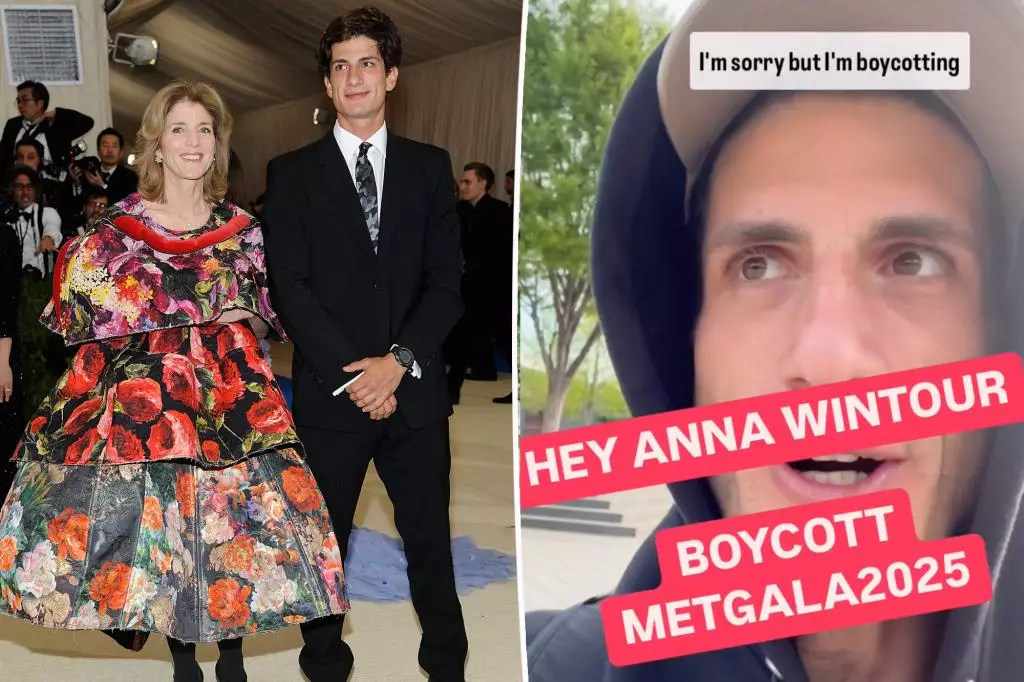An audacious proclamation rings throughout the digital landscape, courtesy of Jack Schlossberg, the young heir to the Kennedy dynasty and son of Caroline Kennedy. As he sets his sights on the upcoming Met Gala, Schlossberg’s social media tirade seems to tread the fine line between principled activism and mere self-promotion. His announced boycott of the gala, widely recognized as the “Oscars of fashion,” raises eyebrows, especially considering that he wasn’t on the invite list to begin with. His absence has stirred speculation over whether this is a genuine gesture or a strategic move to garner attention.
Despite his previous attendance as a plus one to his mother, this year, Schlossberg’s non-invite speaks volumes about the exclusivity and the often arbitrary nature of Met Gala invitations. It’s no mystery that the list is packed with influential figures, mostly through connections with major designers or brands willing to pay for seats. Schlossberg’s absence seems to align with the common critiques surrounding the elitism within the fashion world. It begs the question: Is this a legitimate protest, or just an excuse to make noise where it counts?
Signal or Noise? The Nature of Celebrity Activism
Schlossberg’s Instagram feed, now saturated with impassioned posts regarding his “boycott,” raises critical conversations surrounding the role of fashion in societal discourse. His assertion that “fashion is political” confronts the industry’s culture, particularly how it intertwines with social issues — or rather, how it stays quiet amidst them. Is he, though, the right voice to lead this so-called revolution, given his established connections and privileges?
Among his grievances, he chastises his former employer, Vogue, for its apparent silence. But here lies the irony; Vogue is a fashion magazine catering to a luxury market while Schlossberg is vocalizing an inherently political statement. This juxtaposition reveals his inability to recognize that sometimes fashion spaces can be more complex than they appear. Do we expect a fashion magazine, operating under corporate structures, to take radical stances on every societal issue? It’s a layer of complexity that Schlossberg does not seem fully equipped to navigate without sounding disingenuous.
A Paddler on Political Waters: The Messaging Dilemma
The visuals accompanying Schlossberg’s social media blitz — including a particularly ironic image of him paddling away on a board — tell a story of detachment from the very issues he’s claiming to address. How can one wield a paddle board as a metaphor for boycotting a lavish event while simultaneously seeking attention for oneself? Perhaps the metaphor is too literal or too far removed from the urgent realities he purports to empathize with.
The thematic focus of this year’s Met Gala, “Superfine: Tailoring Black Style,” adds another layer of complexity to Schlossberg’s protest, as it attempts to bridge gaps between heritage, representation, and fashion. When he calls out Vogue for their corporate interests, it raises legitimate concerns about diversity and representation in fashion. However, such proclamations can easily slip into self-serving rhetoric if not backed by actionable commitments or authentic engagement with marginalized communities.
The Intersection of Influence and Impact
As Schlossberg veers further into the world of social media activism, one must question whether his subsequent self-initiated projects will translate into substantive change or will remain mere visibility campaigns. He mentions launching an “informative” project on his own news channel — a self-styled response masquerading as media action. Yet, the reality is that influence without real engagement often leads to superficiality.
While he undoubtedly has the platform to amplify critical issues, his apparent unwillingness to invest in genuine dialogue leaves much to be desired. Are followers drawn to speeches that encapsulate real arguments for reform, or to the influencer telling them what they want to hear? This trend of influencer-driven activism can undermine credibility if not anchored in an understanding of the systemic issues at hand.
In the end, Schlossberg’s decision to boycott—and how the world perceives it—serves as a compelling commentary on the celebration of privilege cloaked in the cloak of activism. Whether he stands as a trailblazer of change or simply another voice in a crowded room will depend largely on the actions he takes next. In a world that desperately needs authentic engagement with pressing societal issues, it’ll be interesting to see what narrative unfolds.

